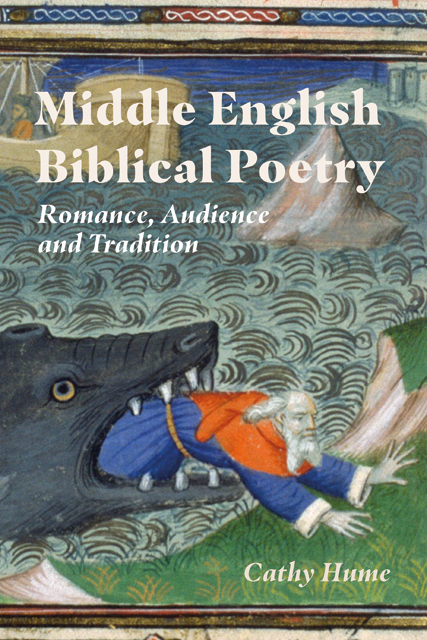Book contents
- Frontmatter
- Dedication
- Contents
- List of illustrations
- Acknowledgements
- List of abbreviations
- Note on translations
- Introduction
- 1 Iacob and Iosep: a happy tale of a knightly family
- 2 Two lives of Adam and Eve: exemplarity after the Fall
- 3 A Pistel of Susan: beauty in a Babylonian garden
- 4 Patience: anti-romance
- 5 Cleanness: household virtues, familiar sins
- Conclusion
- Bibliography
- Index of manuscripts
- General index
5 - Cleanness: household virtues, familiar sins
Published online by Cambridge University Press: 04 January 2024
- Frontmatter
- Dedication
- Contents
- List of illustrations
- Acknowledgements
- List of abbreviations
- Note on translations
- Introduction
- 1 Iacob and Iosep: a happy tale of a knightly family
- 2 Two lives of Adam and Eve: exemplarity after the Fall
- 3 A Pistel of Susan: beauty in a Babylonian garden
- 4 Patience: anti-romance
- 5 Cleanness: household virtues, familiar sins
- Conclusion
- Bibliography
- Index of manuscripts
- General index
Summary
Cleanness is the most complex poem discussed in this book. In some ways it follows the same approach as the poems we have already encountered: it takes a historical rather than allegorical approach to biblical stories, and silently combines its biblical source with historical material and romance influences. It appears after Pearl and before Patience in MS Cotton Nero A X, and as with Patience, the poem’s opening word, ‘Clannes’, announces its theme – something that again sets it apart from most other biblical literature. But here that theme is explored through multiple biblical episodes. The poet’s contention is that God loves cleanness, and is angered by ‘fylthe’ (6), and he initially demonstrates this through a retelling of the parable of the wedding guest in foul clothes, found in Luke 14 and Matthew 22. A short discussion of the Fall of Lucifer and that of Adam and Eve functions as a bridge before a full account of Noah’s Ark from Genesis 6–9, beginning with a discussion of the sins of the people who lived before the Flood. The middle section of the poem tells the story of Abraham receiving a celestial visit, the destruction of Sodom and Gomorrah, and God turning Lot’s wife into a pillar of salt, from Genesis 18–19. After another bridging section, the final episode follows: Belshazzar’s Feast, from Daniel 5. This tells how Belshazzar, the proud and decadent king of Babylon, misused the vessels from the Temple in Jerusalem and was first terrified by the apparition of a hand writing mysterious characters and then punished with a horrific death. That episode is preceded by an explanation of how the vessels were created, how God caused Nebuchadnezzar to defeat the Jews and conquer Jerusalem, and how Nebuchadnezzar treated the vessels with respect, all pieced together from Kings, Chronicles and Daniel 1. As the poem proceeds, the meanings of ‘clean’ and its opposites are expanded and explored.
The combination of episodes in Cleanness makes it unique among Middle English biblical poems. As discussed in the Introduction, most of these present either a single episode – as with the other poems in this book – or, at the other extreme, the whole of creation history (as with Cursor Mundi).
- Type
- Chapter
- Information
- Middle English Biblical PoetryRomance, Audience and Tradition, pp. 147 - 184Publisher: Boydell & BrewerPrint publication year: 2021



